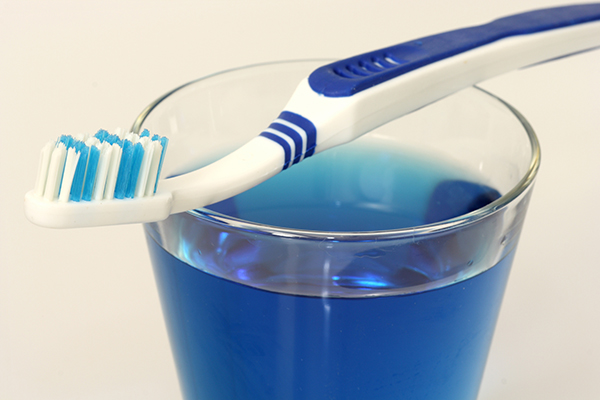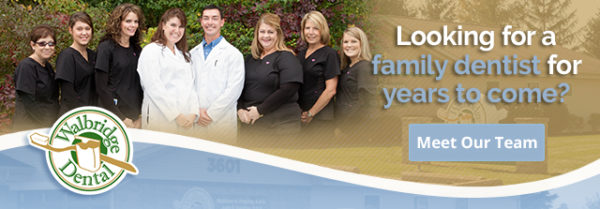
When you go to the dentist, you may have heard mentions of fluoride mouthwash or fluoride toothpaste. They may have even recommended you to include it as part of your dental care routine! But what is dental fluoride, and why is it so popular with dentists?
Read on to learn more about dental fluoride, its benefits and how you can use it to help keep your teeth healthy.
What Is Dental Fluoride?
You may think of fluoride as a medical chemical, but it’s a completely natural mineral. It can be found in the ground, as well as food and natural water sources. Dental fluoride is a specific concentration of the mineral, typically added to other dental care products to work with your standard care routine.
Researchers in the 1930s identified a correlation between communities with natural fluoridation in their water and lower rates of dental cavities. More studies since then continue to support the benefits of fluoride for dental health.
How Does Dental Fluoride Help?
But how exactly does dental fluoride benefit you? The first, and the most important factor is that it prevents unhealthy bacterial growth in your mouth. Bacteria are the primary cause of cavities and gum disease.
When they’re allowed to grow and thrive, they collect into larger groups and harden, turning into plaque and then tartar. Over time, the bacteria cause wreak havoc on your teeth and trigger inflammation in your gums. Fluoride helps prevent this attack on your oral health by making it harder for bacteria to attach to the surface of your teeth.
Because on-going tooth decay requires bacteria, this mechanism also makes fluoride effective at reversing early tooth decay. While it’s still not as effective as regular brushing and dentist visits, it can help prevent a small amount of decay from growing into a problem that requires solutions like a root canal!
Secondly, fluoride also helps remineralize your tooth enamel. Your tooth enamel is the first line of defense against decay, but over time it wears away from abrasion and acid. All it takes is a small amount of fluoride to help activate the remineralization process!
Stronger enamel leads to fewer long-term dental cavities and healthier teeth. The remineralization also fights the general loss of minerals in your tooth enamel that happens over time!
Fluoride Benefits Across Life Stages
Fluoride plays an important role in protecting your teeth at every age. From young children just getting their first tooth to seniors managing changes in their dental health, fluoride helps strengthen enamel and guard against cavities.
In children, fluoride is essential for developing strong, healthy teeth. It helps the enamel form properly and makes it more resistant to acid and bacteria. That’s why dentists often recommend fluoride treatments for kids, especially if they’re at higher risk for decay.
For teens and adults, fluoride continues to help by repairing early signs of tooth decay before they turn into cavities. Many adults benefit from using fluoride mouth rinses or professional fluoride treatments during routine dental visits.
As we age, new dental challenges can emerge, like gum recession and dry mouth—both of which can increase the risk of cavities. Seniors can benefit from continued fluoride use to help protect exposed root surfaces and maintain tooth strength.
No matter your age, fluoride remains a safe and effective way to keep your smile healthy for years to come.
How Can I Add Fluoride to My Dental Care?
Most dentists that recommend fluoride for patients will suggest one of two primary sources:
Toothpaste
Toothpaste with fluoride is fairly common. But if you don’t use toothpaste, or if you use a natural toothpaste that doesn’t have fluoride, you may want to look for an alternative that contains the mineral. All it takes is a small amount of fluoride to pass on the benefits!
Fluoridate toothpaste helps protect your teeth in addition to cleaning them, making it a two-for-one benefit for your health. Since you should be brushing twice daily already, it’s the simplest way to improve your oral health!
The only risk of fluoride toothpaste is swallowing it – as you shouldn’t ingest fluoride. Because of this, children’s toothpaste typically won’t have fluoride.
Mouthwashes
Mouthwash comes in all shapes and sizes. Each one advertises a unique benefit, such as tooth whitening, tartar control and more. But the real difference is whether or not it contains fluoride.
Over-the-counter mouthwashes with small amounts of fluoride are often all you need to help protect your teeth. Simply rinsing with these once a day can give you the boost you need to fight bacteria.
Sometimes, however, dentists will prescribe a concentrated dental fluoride rinse that’s much more effective at ensuring you get the benefits. These can be helpful for children who may seem cavity-prone, providing them with more protection against decay and bacteria.
What About Fluoridated Water?
You may have heard about fluoride for dental health in water supplies for cities and town across the country. It’s true! Since the late 1940s, cities have been adding or adjusting fluoride levels in public drinking water. This is due to the research that found connections between naturally fluoridated water and lower cavities.
Since beginning this effort, municipalities have had success lowering the cavity rate of their communities. It’s likely the tap water in your area has fluoride for dental health, though not all places will.
Likewise, if you don’t drink tap water, you won’t benefit from the change. That’s why additional sources of fluoride are important – such as from toothpaste or mouthwashes. Keep this in mind if your dentist specifically recommends fluoride to help you fight back against tooth decay.
The Economic Benefits of Fluoridation
Fluoride doesn’t just protect your teeth – it also helps protect your wallet. Community water fluoridation is one of the most cost-effective public health measures in place today. For every dollar spent on fluoridation, studies show it can save up to $38 in dental treatment costs.
That’s because fluoride works behind the scenes to prevent cavities before they start. Fewer cavities mean fewer fillings, crowns, or extractions – and fewer visits to the dentist for costly restorative procedures.
This kind of savings adds up not only for individuals but also for families, schools, employers, and entire communities. Preventing dental problems early leads to fewer missed school days for kids and less time off work for adults.
In short, investing in fluoride is a smart move that pays off in both better health and long-term savings.
Does Fluoride Have Any Risks?
The one question that many parents ask is whether or not fluoride has any negatives. There is one notable risk in regards to fluoride, and it’s not common due to being easily avoidable.
While fluoride content in most sources is low, frequent ingesting of fluoride over a short period of time can lead to fluorosis. This is one of the primary reasons that children’s toothpastes lack fluoride, and why dentists are so clear about not swallowing fluoride mouthwashes.
Fluorosis can affect multiple parts of your body. Dental fluorosis affects your teeth, leaving white streaks on your enamel. This typically isn’t a harmful condition, and is generally considered a cosmetic issue. However, in some cases, severe fluorosis can weaken teeth and cause permanent damage.
Another type of fluorosis is skeletal fluorosis. Like dental fluorosis, this is caused by excessive ingestion of fluoride over longer periods of time. Skeletal fluorosis leaves your bones more prone to fractures due to hardening and reduced mobility.
Do You Have Dental Health Questions? Schedule an Appointment!
If you have dental health concerns or just looking for information, the professionals at Walbridge Dental provide complete family dental care to families in the Millbury community. Contact us online to set up an appointment now or call us at 419-836-1033.
Connect on Social Media!

